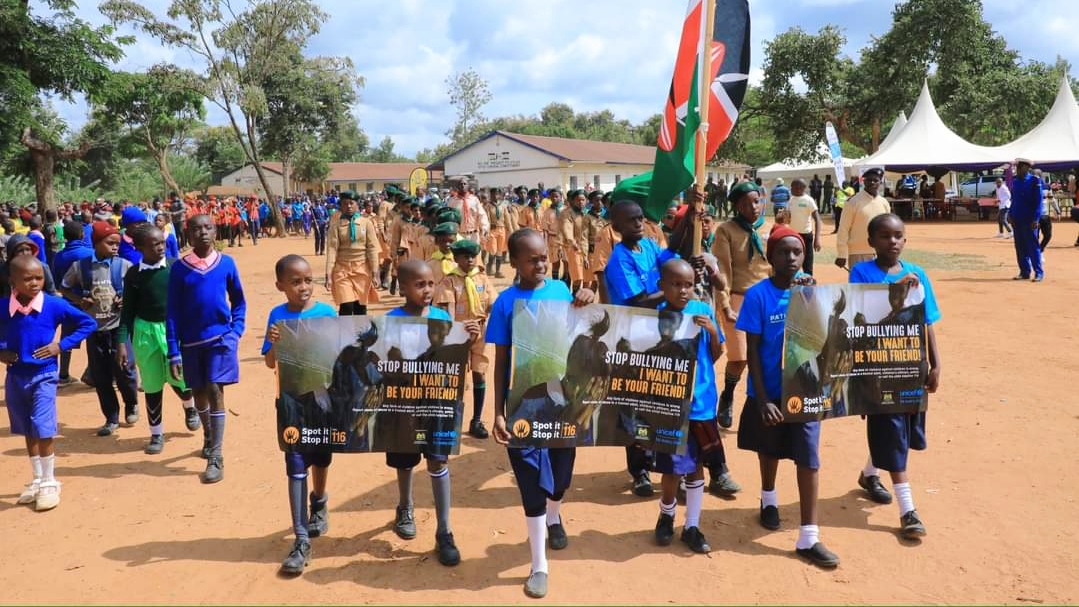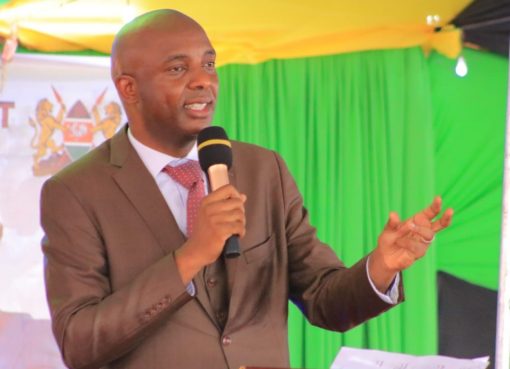The Cabinet Secretary for Education, Ezekiel Machogu, has reiterated the government’s commitment to build resilient education systems for increased access to inclusive relevant learning and equitable universal basic education.
The CS underscored his ministry’s responsibility to ensure it creates an enabling environment where children can grow, learn, and build talents effectively.
Machogu made the remarks in a speech delivered on his behalf by the Director for the Policy Directorate at his Ministry, Bartholomew Lumbasi, during the official launch of this year’s celebrations of the Day of the African Child, held on Sunday at Ithokwe Primary School in Kitui County.

The CS noted that the Kenya Kwanza Administration, under the leadership of President Dr. William Samoe Ruto, continues to invest heavily in education towards the realisation of quality education for all.
“The Kenya Kwanza Government continues to prioritise education, and the MOE receives the largest allocation of the government budget. We are investing this money in infrastructural expansion to meet the growing demand for education facilities,” CS Machogu said.
He further said that the Ministry has employed more teachers and promoted those already in service, promising that they will continue providing teaching and learning materials and funding Free Primary, and Junior Secondary education.
“We have also implemented various initiatives to enhance access, retention, transition, and completion for all children, including those with disabilities, refugee children, pregnant adolescent mothers, and other vulnerable groups.
Scholarship programmes and bursary schemes have also been put in place to support needy children in order to ensure that no child is left behind,” the education CS added.
On university education, Machogu said that his Ministry has reformed the funding arrangements for university education to ensure that no one misses education because of the economic status of their parents or guardians.
Labour and Social Protection Cabinet Secretary, Ms. Florence Bore, who also graced the occasion, said that the government has developed a new children act in efforts to put in place many laws, policies, and guidelines to safeguard the rights and welfare of the Kenyan child.
In her speech delivered on her behalf by the Principal Secretary, State Department for Social Protection and Senior Citizen Affairs, Joseph Motari, the CS, said that the day gives the country an opportunity to take stock of what has been done for the children and reflect on what more needs to be done to ensure that the children fully enjoy their rights.
CS Bore explained that citizens are required to take all appropriate measures towards the full realisation of this right, and in particular, provide free and compulsory basic education, encourage the development of secondary education in its different forms, and progressively make it free and accessible to all children in line with sustainable development goals number four (4) on the provision of inclusive and equitable quality education that promotes lifelong learning opportunities for all.
The Charter further requires member states to make higher education accessible to all on the basis of capacity and ability; take measures to encourage regular attendance at schools and the reduction of drop-out rates; and also take special measures in respect of female, gifted, and disadvantaged children, to ensure equal access to education for all sections of the community,” the Cabinet Secretary noted.
Noting that the 2022 Children’s Act states that every child has a right to a basic education, this resonates with Article 53(1)(b) of the Constitution. She appreciated that Kenya has made great strides in implementing the Charter, especially with regard to children’s access to education.
“As part of the government’s efforts to ensure that children access education, my Ministry implements the Presidential Secondary School Bursary Fund for Orphans and Vulnerable Children, amounting to Sh. 400 million, targeting an average of 22,000 children in public boarding secondary schools every year. Similarly, the Inua Jamii programme, which is under my Ministry, supports households with orphans and vulnerable children as well as children with severe disabilities,” she noted.

“This programme aims at cushioning families from the effects of poverty and thus ensuring that children are enrolled and retained in school,” she said.
The CS noted Children with special needs and disabilities are among the most vulnerable groups of people in our community, and as such, they encounter unique challenges in accessing education.
“In this regard, the National Council for Persons with Disabilities, a state corporation under my Ministry, pays school fees for children with disabilities registered under the Council from primary to tertiary education,” the Labour and Social Protection, Cabinet Secretary said.
The Council also supports schools with infrastructure and equipment grants. Schools use these grants to put up disability-friendly facilities with the aim of making life comfortable for these children. These efforts go a long way towards ensuring the retention of children in school.
Ms. Bore regretted that children drop out of school due to family breakdowns, among other factors. In order to address this vice and in recognition of the family unit as the basic social fabric of society, her Ministry has developed various policies, including the National Policy on Family Promotion and Protection, which is a component of a parenting programme currently being scaled up across the country to facilitate the wholesome growth and development of children.
On child labour, the cabinet secretary said that her Ministry remains the central player in the fight against child labour to prevent children from leaving school for employment.
“The process of reviewing the National Policy on Elimination of Child Labour is ongoing. This Policy will guide on combating child labour in both formal and informal sectors of our economy,” the CS added.
Kitui County Governor Dr. Julius Malombe, while speaking on the occasion, underlined some of the development activities and projects his government has made in support of education for children.
He said that during his leadership, they have employed a total of 1688 ECDE teachers on permanent and pensionable terms, with the County government spending over Sh 600 million annually for their remuneration.
Dr. Malombe further noted that there are 1,536 ECDE centres across the county with an enrolment of 52,099 children and that 42 free feeding centres have started in schools.
Governor Malombe added that in the current financial year 2023-2024, 40 ECDE classrooms have been constructed and that each of the classrooms has a 10,000-litre water tank for water supply.
The week-long event of celebrating the African child is meant to bring awareness to the plight of the African child, and the national event will be held at Mwatate Primary School in Taita Taveta County on June 16, 2024.
Other leaders who graced the occasion included Kitui Central Member of Parliament Dr Makali Mulu and Kitui County Commissioner Jepchumba Ruto.
By Denson Mututo and Brian Kaleso




